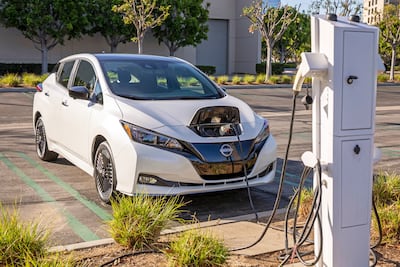Japan’s three biggest car makers rank the lowest among global companies when it comes to decarbonisation efforts, a study by Greenpeace showed, as the climate crisis intensifies the need to shift to zero-emission vehicles.
While the EU has taken steps to ban the sale of new combustion-engine vehicles by 2035, and China has boosted its share of battery-powered electric cars, the largest car makers in Japan — Toyota Motor, Nissan Motor and Honda Motor — have been slower to respond, the environmental advocacy group said in a statement on Thursday.
Toyota scored the lowest among top 10 producers for a second year running. Zero-emission vehicles made up only 0.18 per cent of its total sales last year versus General Motors at 8.18 per cent.
Toyota, the world’s biggest car maker, has hastened its push to electrify more of its line-up even though it sees hybrid and hydrogen fuel cell cars as part of a greener future.
The Japanese car maker last month pledged to invest up to 730 billion yen ($5.6bn) to boost electric car battery production in Japan and the US as consumer demand for cleaner transport rises.

“Traditional auto makers have been relatively slow to embrace zero-emission vehicles across major markets,” Greenpeace said.
Particularly, the three Japanese car makers “have made little progress towards increasing the portion of zero-emission vehicles on the road”.
Toyota also lags in supply chain decarbonisation, Greenpeace said.
The ranking of Toyota’s domestic peers Nissan and Honda fell three notches to eighth and ninth, respectively, Greenpeace’s analysis showed.
“In this diversified world, in an age where we do not know what the correct answer is, it is difficult to make everyone happy with only one option,” the car maker said.
“That is why Toyota will continue to make every effort possible to offer as many options of BEVs and other multi-powertrains to our customers around the world.”
Toyota has also said it will achieve carbon neutrality at all its plants by 2035.
“We continue to promote the introduction and daily improvement of innovative technologies and the introduction of renewable energy and the use of hydrogen. We are introducing 100 per cent renewable electricity at all plants in Europe and South America,” it said.
Nissan did not comment on the report but said more broadly it “aims to become a truly sustainable company, driving towards a cleaner, safer and more inclusive world”.
The car maker also noted that it had contributed to the democratisation of EVs, with the launch of the Nissan Leaf in December 2010.

Honda declined to comment on the Greenpeace report but said the company plans to take steps to achieve carbon neutrality in 2050.
Scores were based on car makers’ performance in three categories — combustion engine phase-out (77 per cent), supply chain decarbonisation (18 per cent) and resource reduction and efficiency (5 per cent). While targets that specify plans for battery EVs and fuel-cell EVs were assessed, targets including plug-in hybrid electric vehicle and hybrid electric vehicle plans were excluded.
Beyond Japan, the study concluded that none of the world’s 10 biggest car manufacturers exceeded 9 per cent zero-emission vehicle sales in 2021, meaning they are not moving away from fossil fuels at a rate sufficient to ensure that the Earth remains within a 1.5°C global annual average temperature rise.
Greenpeace also said in a separate study last month that the top three Japanese car makers were facing the greatest risk from climate change because much of their manufacturing remains concentrated in the island nation.
SUVs consume on average about one quarter more energy than medium-sized cars and contribute substantially to the industry’s demand for steel, Greenpeace said.
Toyota, Honda and Nissan will face major challenges ranging from hurricanes and flooding to high temperatures and water shortages in the coming years based on where their factories are located, the Greenpeace report found.










